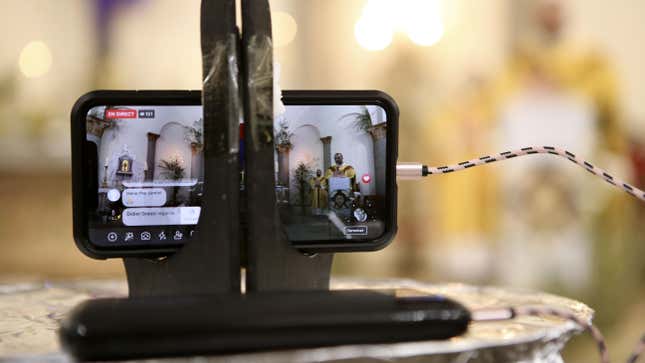
Facebook is trying to commune with God, but definitely not in a Tower of Babel way or anything.
The social media giant is arguably the closest that humans have come to competing with the divine for access to the innermost thoughts of billions of people. Now it’s intensifying a years-long effort to deepen its official partnerships with religious organizations across the country and center itself in developing trends in faith, the New York Times reported on Sunday.
In one highlighted example, Sam Collier, the pastor of a new branch of the global evangelical megachurch Hillsong opening soon in Atlanta, told the Times that Facebook had proposed working with the church to develop apps related to everything from streaming services to financial giving. (Collier said he couldn’t share more specifics due to a confidentiality agreement.) Other churches have also been the beneficiary of Facebook’s efforts to expand its faith-focused feature set. The Times reported that the company gave the Church of God in Christ, a Pentecostal church whose membership is primarily Black, early access to features such as a $9.99 monthly subscription service that allowed users to receive “exclusive content” from a bishop and another that allows real-time donations—a new source of revenue for the “prosperity gospel” set. The church turned down testing another feature that would, uh, inject ads into video streams.
Facebook is also working to encourage faith groups to socialize more on the platform and has plans to launch new products related to sharing audio and prayer, according to the Times. The company had confirmed earlier this year that it is testing a “prayer posts” feature that enables the administrators of Facebook Groups to allow users to request others pray with them, with those users, in turn, hitting a prayer button to confirm they have. Bobby Gruenewlad, the pastor of Oklahoma’s Life. Church and creator of bible app YouVersion, told the paper YouVersion had not only worked with Facebook on that feature, but a Bible-verse-a-day functionality in 2018. The Assemblies of God got early access to features that allow Facebook users to call into video streams, the paper wrote, while Dallas megachurch The Potter’s House gained access to “various features before they were rolled out.”
At a religious faith summit in June 2021, the Times wrote, Facebook chief operating officer Sheryl Sandberg directed religious leaders to a hub of information on how the site could help build congregations and expressed her hope that in the future, the religious “will host religious services in virtual reality spaces as well, or use augmented reality as an educational tool to teach their children the story of their faith.” The summit also included testimonials from an Imam in California and a Catholic media magnate about how Facebook offered tools that kept the faithful in touch during the novel coronavirus pandemic.
Given this is Facebook, a company that is continually mired in scandal after scandal and is known for prioritizing its business concerns over everything from fighting the spread of far-right misinformation to preventing literal genocide, not everyone is convinced its motives are any purer here. For example, University of Edinburgh theology and science lecturer Sarah Lane Ritchie suggested to the Times that the company’s interests may lay in the absolutely massive amount of personal information the religious may share with clergy or their communities, particularly elderly worshipers who may not realize how Facebook monitors their time on the site.
“Corporations are not worried about moral codes,” Ritchie told the paper. “I don’t think we know yet all the ways in which this marriage between Big Tech and the church will play out.”
One might also point out that rather than bringing people together, Facebook often radicalizes and divides everything it touches, with its track record on politics not exactly a good omen for its forays into religion.
“Facebook basically said, hey, we want to be the It, we want to be the go-to,” Reverend Samuel Rodriguez, the Sacramento-based evangelical who leads the National Hispanic Christian Leadership Conference, told the Times.